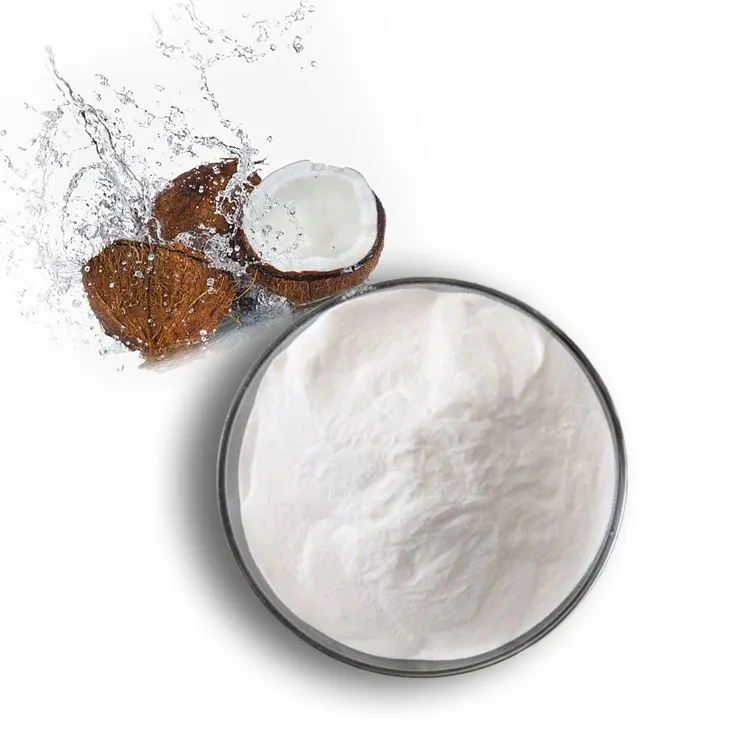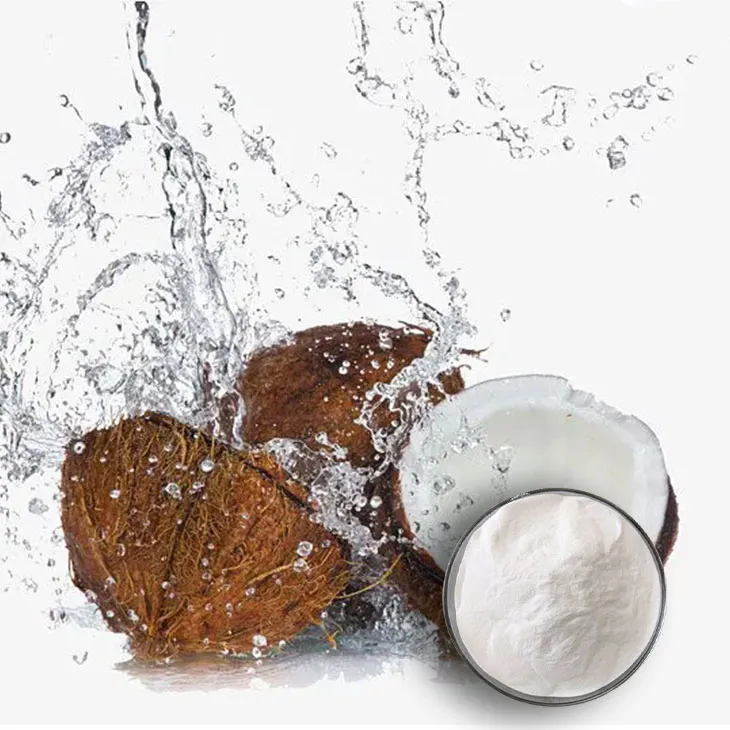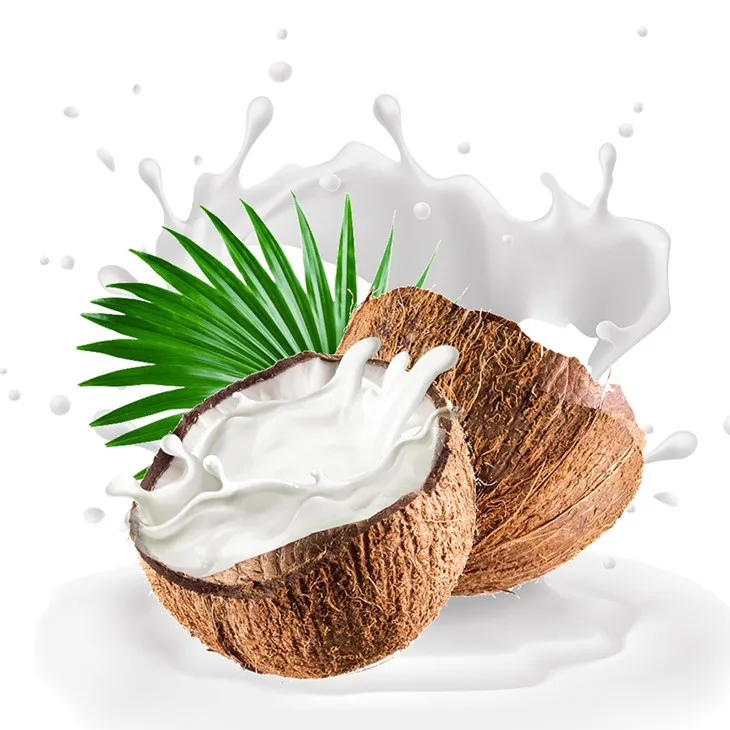- 0086-571-85302990
- sales@greenskybio.com
Coconut water powder: fertilizer and feed components.
2024-11-29

1. Introduction
Coconut Water Powder has emerged as a valuable component in both fertilizers and feeds. Derived from the liquid endosperm of coconuts, this powder is rich in a variety of nutrients and bioactive substances. Understanding its composition and the roles these elements play in promoting plant and animal health is of great significance.

2. Composition of Coconut Water Powder
2.1 Carbohydrates
Coconut Water Powder contains a significant amount of carbohydrates. These are mainly in the form of sugars such as sucrose, glucose, and fructose. Carbohydrates play a crucial role in both plants and animals.
- In plants, they serve as an energy source for various metabolic processes. For example, during photosynthesis, plants produce carbohydrates, but having an additional source like coconut water powder can supplement their energy needs, especially during periods of high growth or stress.
- In animal feeds, carbohydrates are a major source of energy. They are broken down during digestion to release energy that animals use for movement, growth, and maintenance of body functions.
2.2 Amino Acids
Although coconut water powder may not be as rich in protein as some other sources, it still contains certain amino acids. These amino acids are the building blocks of proteins.
- For plants, some amino acids can act as precursors for the synthesis of enzymes and other important proteins. For instance, lysine and methionine are essential for plant growth and development. They are involved in processes such as cell division and the formation of chlorophyll.
- In animal nutrition, amino acids are vital for growth, muscle development, and the repair of tissues. Animals need a balanced supply of different amino acids from their diet, and the presence of amino acids in coconut water powder can contribute to this requirement.
2.3 Vitamins
Coconut water powder is a source of various vitamins.
- Vitamin C, for example, is present in coconut water powder. In plants, vitamin C acts as an antioxidant, protecting plants from oxidative stress caused by factors such as environmental pollutants and high light intensity. It also plays a role in cell wall synthesis and the regulation of plant growth hormones.
- In animals, vitamin C is important for the immune system, collagen synthesis, and the prevention of diseases such as scurvy. The inclusion of coconut water powder in animal feeds can provide an additional source of this essential vitamin.
- Other vitamins such as B - group vitamins (e.g., thiamine, riboflavin) are also present. In plants, they are involved in processes like respiration and the metabolism of carbohydrates. In animals, B - group vitamins are crucial for proper nerve function, energy metabolism, and the health of the skin and coat.
2.4 Minerals
Coconut water powder contains several important minerals.
- Potassium is one of the major minerals in coconut water powder. In plants, potassium is involved in many physiological processes, including osmoregulation, stomatal opening and closing, and the activation of enzymes. Adequate potassium supply promotes strong stems, healthy leaves, and better fruit quality in plants.
- In animals, potassium is essential for maintaining proper heart function, nerve impulse transmission, and fluid balance. Coconut water powder can be a source of potassium in animal feeds.
- Calcium is also present in coconut water powder. In plants, calcium is important for cell wall structure and integrity. It also plays a role in signal transduction and the regulation of various physiological processes. In animals, calcium is well - known for its role in bone and teeth formation, muscle contraction, and blood clotting.
- Magnesium, another mineral in coconut water powder, is a component of chlorophyll in plants. It is also involved in enzyme activation and the regulation of photosynthesis. In animals, magnesium is important for muscle and nerve function, as well as for the metabolism of carbohydrates and proteins.
2.5 Phytohormones (in the context of plant fertilizers)
Coconut water powder contains phytohormones, which are natural plant growth regulators.
- Cytokinins are one type of phytohormone present in coconut water. Cytokinins promote cell division in plants, which is crucial for growth. They also delay senescence, allowing plants to maintain their green leaves and photosynthetic capacity for a longer period.
- Another phytohormone, auxin, may also be present in small amounts. Auxin is involved in many aspects of plant growth, including root development, apical dominance, and the tropic responses of plants to environmental stimuli.

3. Significance in Plant Health
3.1 Growth Promotion
The nutrients and phytohormones in coconut water powder contribute to plant growth.
- The carbohydrates, amino acids, and minerals provide the necessary building blocks and energy for cell division, elongation, and differentiation. This results in increased plant height, more extensive root systems, and a greater number of leaves and branches.
- The phytohormones, such as cytokinins and auxins, directly regulate plant growth processes. For example, cytokinins can stimulate the growth of lateral buds, leading to a bushier plant, while auxins can promote root initiation in cuttings, which is useful in plant propagation.
3.2 Stress Resistance
Coconut water powder can enhance a plant's ability to resist various stresses.
- The vitamins and antioxidants present, such as vitamin C, can protect plants from oxidative stress. Oxidative stress can be caused by factors like drought, high salinity, or exposure to pollutants. By scavenging free radicals, these substances help plants maintain their normal physiological functions.
- The minerals in coconut water powder also play a role in stress resistance. For example, potassium helps plants regulate water balance, which is crucial during drought conditions. Calcium can strengthen cell walls, making plants more resistant to mechanical damage and pathogen invasion.
3.3 Nutrient Uptake and Utilization
Coconut water powder can improve nutrient uptake and utilization in plants.
- Some of the amino acids and organic acids in the powder can chelate or bind with soil nutrients, making them more available for plant roots to absorb. For example, they can increase the availability of micronutrients such as iron, zinc, and manganese.
- The presence of phytohormones can also affect nutrient uptake. For instance, cytokinins can enhance the activity of root cells, increasing their ability to absorb nutrients from the soil.

4. Significance in Animal Health
4.1 Energy Supply and Growth
The carbohydrates in coconut water powder are a valuable source of energy for animals.
- For livestock such as cattle, sheep, and pigs, the energy obtained from coconut water powder - derived carbohydrates can be used for growth, milk production (in the case of dairy animals), and maintenance of body functions. This can lead to increased body weight gain and improved productivity.
- In poultry, the energy from these carbohydrates is important for egg production, growth of chicks, and overall performance. Adequate energy supply is essential for maintaining good health and high - quality production in the poultry industry.
4.2 Nutrient Supplementation
The amino acids, vitamins, and minerals in coconut water powder supplement the nutrient requirements of animals.
- The amino acids contribute to muscle development, as mentioned earlier. In young animals, they are especially important for proper growth and development. For example, in broiler chickens, a balanced supply of amino acids is necessary for rapid muscle growth and high - quality meat production.
- The vitamins in coconut water powder, such as vitamin C and B - group vitamins, support various physiological functions in animals. Vitamin C helps boost the immune system, while B - group vitamins are involved in energy metabolism and nerve function. Minerals like potassium, calcium, and magnesium are essential for maintaining proper body functions, such as heart function, bone health, and nerve impulse transmission.
4.3 Immune System Support
Coconut water powder can play a role in supporting the immune system of animals.
- The vitamins, especially vitamin C, are known for their immune - enhancing properties. By providing an additional source of these vitamins, coconut water powder can help animals better resist diseases and infections.
- Some of the bioactive substances in coconut water powder may also have immunomodulatory effects, although more research is needed to fully understand these mechanisms.
5. Conclusion
Coconut water powder is a multi - faceted component with great potential in both fertilizers and feeds. Its composition, rich in carbohydrates, amino acids, vitamins, minerals, and in the case of fertilizers, phytohormones, offers numerous benefits for plant and animal health. Understanding these components and their roles allows for more effective utilization of coconut water powder in agricultural and animal husbandry practices, promoting sustainable growth and health in both plants and animals.
FAQ:
What are the main components of coconut water powder in fertilizers?
Coconut water powder in fertilizers may contain various components. It often has a rich source of potassium. Potassium is crucial for plants as it helps in processes like osmotic regulation, enzyme activation, and enhancing the plant's ability to withstand stress. It may also contain trace amounts of other minerals such as magnesium, which is involved in chlorophyll synthesis, and calcium, which plays a role in cell wall structure and function in plants.
How does coconut water powder in feed contribute to animal health?
In animal feed, coconut water powder can offer several benefits. It contains certain nutrients and bioactive compounds. For example, it may have antioxidants that can help reduce oxidative stress in animals. It can also be a source of carbohydrates, which provide energy. Additionally, it may contain vitamins and minerals in small amounts that are essential for normal physiological functions in animals, such as maintaining proper immune function and growth.
What is the significance of potassium in coconut water powder for plants?
Potassium in coconut water powder is highly significant for plants. It helps in the regulation of water uptake and movement within the plant. This is important for maintaining turgor pressure in cells, which is necessary for proper plant structure. It also plays a role in photosynthesis by influencing the opening and closing of stomata. Moreover, potassium - rich coconut water powder can enhance the plant's resistance to diseases and pests, as well as improve the quality of fruits and vegetables produced by the plant.
Are there any specific amino acids in coconut water powder used in feed?
Coconut water powder may contain some amino acids, although not in large quantities. Amino acids are the building blocks of proteins, which are essential for animal growth, tissue repair, and maintenance. Some of the amino acids present in coconut water powder could potentially contribute to the overall amino acid profile of the feed, supporting the animal's protein synthesis requirements.
How is coconut water powder processed for use in fertilizers and feeds?
For use in fertilizers, coconut water powder is typically obtained through drying and processing methods. The coconut water is first extracted from coconuts. Then, it is dried, either through spray - drying or other drying techniques, to convert it into a powder form. In the case of feed, similar drying processes are used. Additionally, quality control measures are implemented to ensure that the powder meets the required standards for nutrient content and safety for the animals.
Related literature
- The Nutritional Composition of Coconut Water and Its Potential Applications in Agriculture"
- "Coconut Water: A Source of Bioactive Compounds for Animal Nutrition"
- "Utilization of Coconut - Based Products in Fertilizer and Feed Industries"
- ▶ Hesperidin
- ▶ citrus bioflavonoids
- ▶ plant extract
- ▶ lycopene
- ▶ Diosmin
- ▶ Grape seed extract
- ▶ Sea buckthorn Juice Powder
- ▶ Beetroot powder
- ▶ Hops Extract
- ▶ Artichoke Extract
- ▶ Reishi mushroom extract
- ▶ Astaxanthin
- ▶ Green Tea Extract
- ▶ Curcumin Extract
- ▶ Horse Chestnut Extract
- ▶ Other Problems
- ▶ Boswellia Serrata Extract
- ▶ Resveratrol Extract
- ▶ Marigold Extract
- ▶ Grape Leaf Extract
- ▶ blog3
- ▶ blog4
-
100% Pure Organic Black Garlic Extract.
2024-11-29
-
The best - quality astaxanthin.
2024-11-29
-
Active components in bayberry extracts.
2024-11-29
-
Chinese Deer Antler Extract Manufacturers
2024-11-29
-
100% Pure Natural Nettle Leaf Extract.
2024-11-29
-
Longan Extract
2024-11-29
-
Coix Seed Extract
2024-11-29
-
Mulberry leaf Extract
2024-11-29
-
Almond Extract Powder
2024-11-29
-
Chaste Berry Extract
2024-11-29
-
Berberis aristata Extract
2024-11-29
-
Epimedium extract powder
2024-11-29
-
Curcuma Longa Extract/Turmeric extract
2024-11-29
-
Bayberry Extract
2024-11-29
-
Tongkat Ali Extract Powder
2024-11-29





















